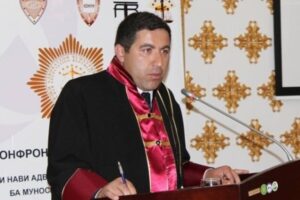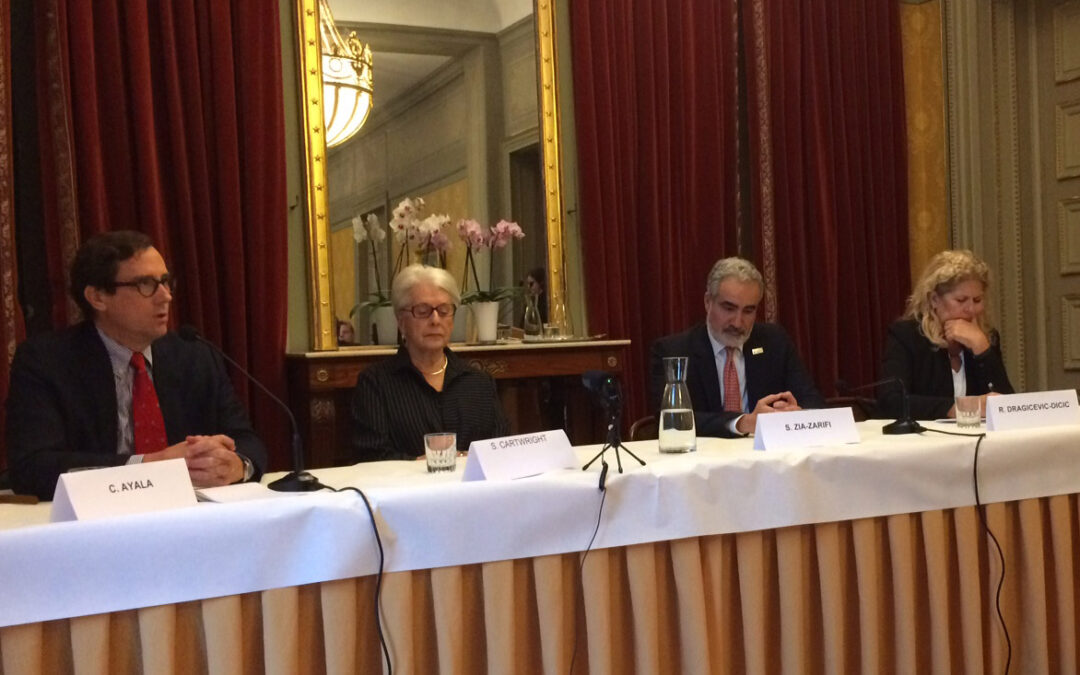
Oct 23, 2018 | Multimedia items, News, Video clips
At an event at the city’s Palais Eynard, prominent ICJ Commissioners discussed the supremacy of the Rule of Law and also why it is important to be in Geneva. Watch the video.
The Executive Committee (ExCo), representing the whole Commission of Jurists, participated in the event.
Sam Zarifi, ICJ Secretary General, opened the event by reiterating the importance for the ICJ to be headquartered in Geneva, not only for the UN and international community but also for the city’s and canton’s legal and human rights community.
“It is absolutely clear that we live at a moment in the world when lawyers, judges, jurists are under attack and it is important for the legal community across the world, regardless of borders, regardless of languages, regardless of legal systems, to come together to defend the notion of the rule of law and defend the security and well-being of lawyers and jurists around the world.”
Carlos Ayala, ICJ’s Vice-President, said the ICJ was a unique organization working in the field of the Rule of Law, not as an isolated notion but within the framework of Human Rights and democracy.
He explained how the ICJ is structured and working around the world and insisted on the impact the ICJ is having through its activities.
He said that the organization’s legal outputs were used to have an impact on the overall human rights situations, cases, court decisions, and in training judges, lawyers, prosecutors and others.
Radmila Dragicevic-Dicic, also ICJ’s Vice-President, insisted on how it is important to share experiences about human rights issues and finding solutions to protect different rights.
She gave her personal example of being a judge in former Yugoslavia and Serbia to show how with tenacity and courage one can help establish an independent judiciary even in some of the hardest situations.
She testified how she was helped by the ICJ and Switzerland in her fight for justice.
“If you fight for independence of judges and lawyers in your country, you fight for judges and lawyers everywhere,” she added.
Dame Silvia Cartwright, ICJ Commissioner and ExCo member from New Zealand, was the first woman appointed to the High Court in New Zealand and she was also Governor General of New Zealand.
She said that she was privileged to come from a country that has always promoted and protected the Rule of Law but that unfortunately many recent examples showed that this endorsement could change overnight.
Very active in the fight for women’s rights she said how through her professional work she realized the terrible impact that the Khmer Rouge’s regime in Cambodia and civil war in Sri Lanka had on women.
“Generally speaking I’m quite pessimistic because I think we have reached another stage of the cycle that seems to occur every couple of generations where we are heading towards a more fascist world. So this is the time when human rights must be protected when we must fight to maintain the norms we have struggled for so long,” she said.
Watch the full event here:
https://www.facebook.com/ridhglobal/videos/335212527229422/
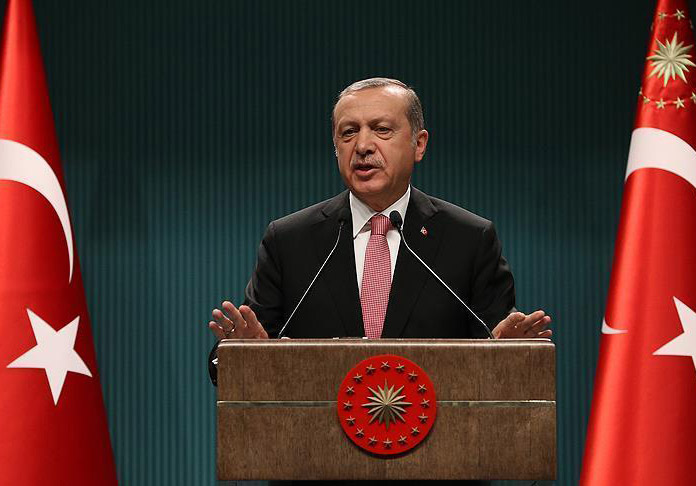
Oct 23, 2018 | News
In light of new information released by Turkish President Recep Tayyip Erdogan about the apparent murder of prominent Saudi journalist Jamal Khashoggi, the Turkish government should seek cooperation from independent and impartial international investigators into the apparent extrajudicial killing of prominent Saudi journalist Jamal Khashoggi in the Saudi Arabian Consulate in Istanbul, the ICJ urged today.
Turkish President Recep Tayyib Erdogan today told the Turkish Parliament that investigations suggested that Saudi officials had planned to kill Khashoggi and he called for all those responsible for the killing to be punished regardless of rank.
“Given the highly political nature of this case and its emblematic impact for journalists and dissidents around the world, Turkey should work with the United Nations to establish a special independent mechanism to carry out the investigation with a view to identifying the perpetrators and prescribing recommendations for appropriate accountability measures,” said Said Benarbia, ICJ’s MENA Programme Director.
“Alternatively, the investigation should be conducted by competent Turkish authorities, given that Turkey already has jurisdiction and an obligation to carry out an investigation,” he added.
Investigations by Turkey to date suggest that the crime was planned, at least in part, in Saudi Arabia, and that perpetrators, evidence and witnesses are located in at least two countries.
Turkish Foreign Minister, Mevlut Cavusoglu, stated today that Turkey is ready to cooperate with an international investigation into Jamal Khashoggi’s death.
“Given the gravity of the crime and the fact that evidence and perpetrators are located outside Turkey, Saudi Arabia and other States should cooperate with an international investigation and waive any diplomatic protections and immunities that may apply to State officials and premises. They should also hand over all forensic, video, audio and other evidence, facilitate investigators’ access to State territory and witnesses, including State officials, and provide the necessary support to locate, retrieve and identify other evidence such as human remains and trace evidence and to carry out an autopsy on Khashoggi’s remains,” Benarbia said.
The ICJ dismissed statements by Saudi Arabia that it would carry out an independent, impartial investigation of the apparent murder.
On 20 October 2018, after initially denying any involvement in Jamal Khashoggi’s enforced disappearance, the Saudi Ministry of Foreign Affairs issued a statement claiming Khashoggi died when a “fight broke out” in discussions with Saudi officials at the consulate.
“Saudi Arabia has provided no evidence to support its incredible claim two weeks on that Jamal Khashoggi died after a fight broke out. Their investigation into his death lacks transparency and independence. Given Saudi Arabia’s past record in countenancing complete impunity for officials involved in serious human rights violations, it is reasonable to expect that this investigation and will result in a cover-up in which those most responsible avoid accountability,” Benarbia added.
Saudi Arabia’s repeated denials that it had any knowledge of the fate of Khashoggi, followed by its claims that “rogue” State operatives were responsible for his death, indicate that any Turkish investigation will be unlikely to elicit any meaningful cooperation from Saudi authorities.
“The denials, obfuscation and scapegoating by Saudi Arabia reveals a contempt for human rights that’s indicative of its modus operandi,” Benarbia said.
“Saudi authorities have repeatedly failed to carry out independent and impartial investigations into allegations that State officials have engaged in widespread arbitrary arrested and detention, torture and other ill-treatment and enforced disappearances, including of journalists, human rights defenders and critics of the government. Since Crown Prince Mohammad bin Salman was appointed in June 2017, repression of the exercise of human rights for political reasons has increased. Those convicted for exercising their lawful rights to freedom of expression, assembly and association face lengthy prison terms or the death penalty, after trials marred by fair trial rights violations,” he added.
Saudi Arabia-Khashoggi intl investigation-News-press releases-2018-ENG (full story with additional background, in PDF)

Oct 23, 2018 | Events, News
This side event will be held on October 25th, 2018, from 13:00 until 14:30 at Room XXVII, Palais des Nations, United Nations, in Geneva.
Organized jointly by the ICJ, the International Institute for Sustainable Development (IISD) and the Friedrich Ebert Stiftung (FES), this session’s goal is to provide a platform for discussion about the benefits and shortcomings of the current model of dispute settlement on investment matters and the needs and directions of future reform.
The debate will assist all participants in the World Investment Forum in understanding the current issues regarding investment dispute settlement and the needs and options for reform with a view to foster a strategy where investment-related dispute settlement and rule of law principles contribute to the sustainable development objectives.
The objectives of the event:
- Provide a platform for informed discussion among practitioners and interested stakeholders in the area of investment-related dispute settlement
- Contribute to an improved understanding of the issues at stake and the options for future reform
- Contribute to the efforts of the international community to achieve common ground in various issues related to investment-related dispute settlement
Issues for debate:
- What should governments expect from the ongoing UNCITRAL process in reforming investor-State dispute settlement (ISDS)?
- Should substantive and procedural issues relating to the current model of dispute settlement on investment matters be addressed in a comprehensive way?
- What are the elements to be considered when discussing the possible creation of an investment court?
- Would people impacted by investment projects have a role and standing in investment-related dispute settlement?
Speakers:
Vu Thi Chau Quynh, Deputy Director General, Department of Legislation, The Ministry of Planning and Investment, Viet Nam
Kekeletso Mashigo, Director, Legal – International Trade, Investment, Tax Trade Negotiations Unit, International Trade and Economic Development Division, Department of Trade and Industry, South Africa
Colin Brown, Deputy Head of Unit – Dispute Settlement and Legal Aspects of Trade Policy – DG TRADE – European Commission
Samira Sulejmanovic, Head, Unit for Bilateral Trade Relations, Ministry of Foreign Trade and Economic Relations, Bosnia and Herzegovina
Jane Kelsey, Professor, Faculty of Law, The University of Auckland, New Zealand
Moderator:
Sam Zarifi, Secretary-General of the ICJ.
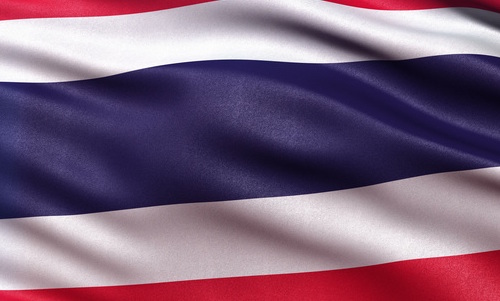
Oct 21, 2018 | News
On 21 October, the ICJ, together with Cross Cultural Foundation (CrCF), organized a lawyers’ meeting in Bangkok on the admissibility of evidence in the context of application of special security laws in Thailand.
Attendees included 30 human rights lawyers, paralegal officers, documentation officers, human rights defenders and journalists from Bangkok and other regions in Thailand.
The objectives of the meeting were:
- To discuss about the challenges that lawyers currently face regarding the admissibility of evidence in criminal proceedings, both in law and in practice, in the context of existing special security laws. These laws include the Martial Law, Emergency Decree, and the Internal Security Act that are applied in the southern border provinces, and certain repressive National Council for Peace and Order (NCPO) Orders that are applied nationwide;
- To discuss how to address the adverse effects on human rights and the administration of justice as a consequence of the implementation of these laws and how lawyers, members of civil society, and other stakeholders, at national and international levels, may work together to address such challenges; and
- To gather recommendations from participants and discuss future advocacy strategies to tackle identified challenges.
The ICJ’s Legal Memorandum on Hearsay Evidence and International Fair Trial Standards was used as one of the main reference materials during the meeting.
A main recommendation of the Workshop, echoed the ICJ’s assessment in the Legal Memorandum, namely that Thailand should review existing standards in all special security laws and relevant articles in the Criminal Procedure Code regarding the admissibility of evidence that are not compatible with international fair trial standards to ensure safeguards required to protect individuals from unfair trials.
Read also
Thailand : legal memorandum – hearsay evidence and international fair trial standards
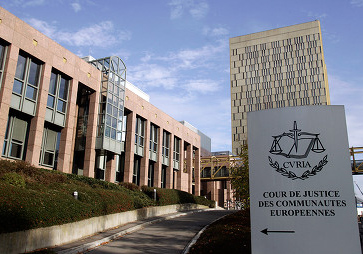
Oct 19, 2018 | News
The ICJ welcomes the interim measures prescribed today by the Court of Justice of the EU as a necessary step in stemming the evident erosion of the rule of law in Poland.
The Court provisionally ordered Poland to preserve the composition of its Supreme Court of 3 April 2018, before a law forcing into retirement a third of the Court’s members entered into force.
The ICJ urges the Polish authorities to comply with the EU Court order by maintaining in office the Supreme Court judges .
“In accordance with today’s court’s order, Polish authorities should immediately rescind all measures taken since April 2018 that modify the composition of the Supreme Court. They are obliged to do this under EU law as it is binding on Polish authorities and by the fundamental principle of the rule of law that decisions of the judiciary must be respected and implemented.” said Róisín Pillay, Director of the ICJ Europe and Central Asia Programme.
On 10 October, President Andrzej Duda appointed 27 judges to the Supreme Court in place of those forcibly “retired” last July. The ICJ condemned this act of the President of Poland because it contravened an order of the Supreme Court suspending the law under which these appointments were made, pending a decision by the EU Court. Critically, the mass and forced retirement of sitting judges before the end of the established terms of tenure undermines their security of tenure, a key principle regarding the independence of the judiciary.
Background
The independence of the judiciary in Poland has been systematically undermined by the Polish executive and legislative authorities.
Earlier this year Poland issued a new law on the Supreme Court that attempts to force the “retirement” of one third of the Supreme Court judges, including the First President, by lowering the mandatory retirement age for its judges from 70 to 65. This measure clearly contravenes international human rights law and standards.
The European Commission has launched an infringement procedure for lack of compliance of this law with EU law.
In the absence of satisfactory reforms by Poland, on 24 September, the Commission referred Poland to the Court of Justice of the European Union (CJEU) and asked for interim measures to restore Poland’s Supreme Court to its situation before 3 April 2018. Today’s decision by the Court of Justice granted this interim measures request.
At the same time, the Supreme Court of Poland submitted a preliminary ruling request to the CJEU seeking its interpretation on the compliance of the legislation on retirement ages of judges with EU law, in particular with the prohibition of discrimination on grounds of age under Directive 2008/78.
An ICJ letter of 11 July 2018, signed by 22 senior judges from all regions of the world, urged the Polish government to act immediately to reinstate the forcibly retired judges in office.








